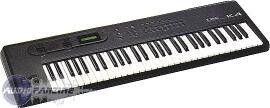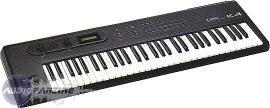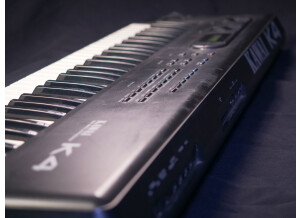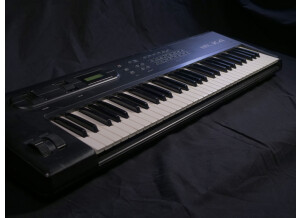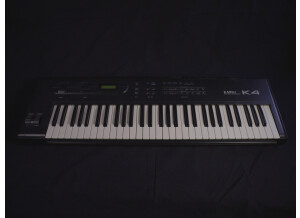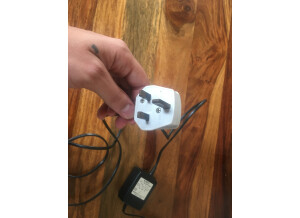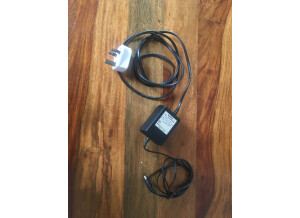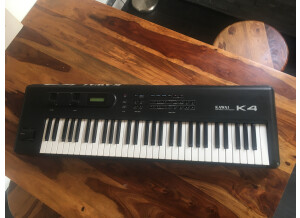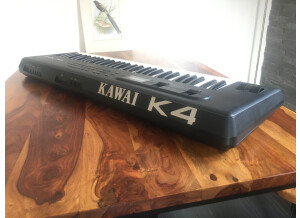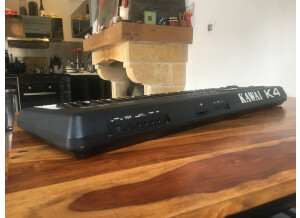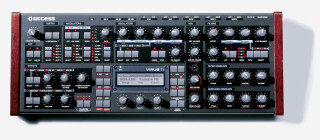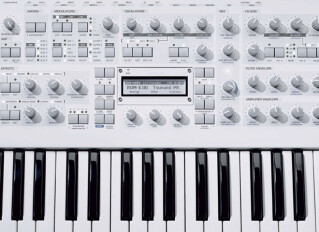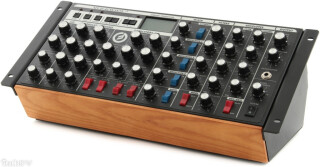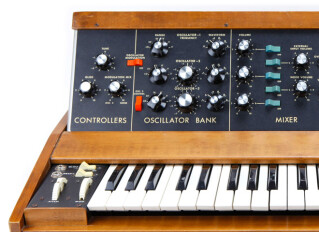K4 classified ad
Alerte nouvelle annonceImages
Videos
Reviews
3.5/5(3 reviews)
33 %
33 %
Write a user review
A listen
Published on 02/27/13 at 11:47 (This content has been automatically translated from French)See other reviews, everything has been said .....
UTILIZATION
Easy to program ...... If you have the basics of subtractive synthesis ...
SOUNDS
Those who love certain sounds vangelis, jarre, Quasimidi The Raven of .... Take a look, or rather listen.
OVERALL OPINION
I used up to 6 at the same time in mix .....
UTILIZATION
Easy to program ...... If you have the basics of subtractive synthesis ...
SOUNDS
Those who love certain sounds vangelis, jarre, Quasimidi The Raven of .... Take a look, or rather listen.
OVERALL OPINION
I used up to 6 at the same time in mix .....
09
»
My first synth ...
Published on 10/28/12 at 11:08 (This content has been automatically translated from French)61-key, synth-type but very enjoyable to play, so much so that it is the only thing that I still use today, over 20 years later.
MIDI connectors, stereo, pitch bend and modulation (not necessarily a reference, but often better than that found today on keyboards MIDI control input range).
Its side, it is on the principle of D50, D10 Roland was referring to the time. The possibility of "synthesis" are also quite close. Side user interface, the same limitations of the programming buttons, menus, and a screen too small. But Mutable Instruments Shruthi and showed me since we could do much better ergonomically with the same type of elements (and 4 potentiometers and encoders anyway)....…
MIDI connectors, stereo, pitch bend and modulation (not necessarily a reference, but often better than that found today on keyboards MIDI control input range).
Its side, it is on the principle of D50, D10 Roland was referring to the time. The possibility of "synthesis" are also quite close. Side user interface, the same limitations of the programming buttons, menus, and a screen too small. But Mutable Instruments Shruthi and showed me since we could do much better ergonomically with the same type of elements (and 4 potentiometers and encoders anyway)....…
Read more
61-key, synth-type but very enjoyable to play, so much so that it is the only thing that I still use today, over 20 years later.
MIDI connectors, stereo, pitch bend and modulation (not necessarily a reference, but often better than that found today on keyboards MIDI control input range).
Its side, it is on the principle of D50, D10 Roland was referring to the time. The possibility of "synthesis" are also quite close. Side user interface, the same limitations of the programming buttons, menus, and a screen too small. But Mutable Instruments Shruthi and showed me since we could do much better ergonomically with the same type of elements (and 4 potentiometers and encoders anyway). Subsequently, I associated the MIDI controller kawai to 17 faders MM-16 and it made things easier ...
The main interest for me compared to Roland, is that the basic sound was different and used including waveforms from additive synthesis of K5 (it was also highlighted by the marketing of the time and I was left thinking trap have a simplified engine K5 which is not the case at all, they are just "samples" of the K5).
The integrated effects were not bad for the time. Architecturally, there are 8 or 16 notes of polyphony according to the number of "COD" used in a patch, for 8 parts multitimbral. Percussion sounds also organizable in drums kits.
UTILIZATION
As already mentioned it is within the programming interfaces of the era: the keys numerous enough to navigate through the menus and the combination of blandness input data and a couple of + / - keys. Adding MM16 has made things easier. The manual was in French is pretty good.
SOUNDS
Sound side, it suits me more, I'm long past anything else. You can do nice things for the time, but nothing transcendent. Attempted imitations of acoustic instruments are fairly poor quality but you can get some original sounds otherwise. Again not so bad in the context of the time, but completely outdated today. Against by digital filters are definitely outdated.
OVERALL OPINION
Used for 22 years (!) But today only the keyboard and the ability to make layers and splits MIDI to external devices.
At the time I tried the D50/D10 and D50 but M1 and M1 were off-budget, and I wanted the multitimbral.
The keyboard seemed better and more original sound.
Of course, today with the same budget, I would look elsewhere probably on hand products.
In nine of the era in the same price, I probably lorgnerais rather Juno/PG300 torque, and nine today a Mopho 4x. But it is still my only stayed long enough instrument coupled with a hardware MIDI sequencer.
Only the keyboard part is all that is more valuable compared to keyboards available today, I've tried a good fifty at the last and only MusikMesse Radikal Accelerator, John Bowen Solaris (probably from this which is better), the Studiologic Sledge and Nektar Panorama gave me a good impression compared to my usual K4 ...
MIDI connectors, stereo, pitch bend and modulation (not necessarily a reference, but often better than that found today on keyboards MIDI control input range).
Its side, it is on the principle of D50, D10 Roland was referring to the time. The possibility of "synthesis" are also quite close. Side user interface, the same limitations of the programming buttons, menus, and a screen too small. But Mutable Instruments Shruthi and showed me since we could do much better ergonomically with the same type of elements (and 4 potentiometers and encoders anyway). Subsequently, I associated the MIDI controller kawai to 17 faders MM-16 and it made things easier ...
The main interest for me compared to Roland, is that the basic sound was different and used including waveforms from additive synthesis of K5 (it was also highlighted by the marketing of the time and I was left thinking trap have a simplified engine K5 which is not the case at all, they are just "samples" of the K5).
The integrated effects were not bad for the time. Architecturally, there are 8 or 16 notes of polyphony according to the number of "COD" used in a patch, for 8 parts multitimbral. Percussion sounds also organizable in drums kits.
UTILIZATION
As already mentioned it is within the programming interfaces of the era: the keys numerous enough to navigate through the menus and the combination of blandness input data and a couple of + / - keys. Adding MM16 has made things easier. The manual was in French is pretty good.
SOUNDS
Sound side, it suits me more, I'm long past anything else. You can do nice things for the time, but nothing transcendent. Attempted imitations of acoustic instruments are fairly poor quality but you can get some original sounds otherwise. Again not so bad in the context of the time, but completely outdated today. Against by digital filters are definitely outdated.
OVERALL OPINION
Used for 22 years (!) But today only the keyboard and the ability to make layers and splits MIDI to external devices.
At the time I tried the D50/D10 and D50 but M1 and M1 were off-budget, and I wanted the multitimbral.
The keyboard seemed better and more original sound.
Of course, today with the same budget, I would look elsewhere probably on hand products.
In nine of the era in the same price, I probably lorgnerais rather Juno/PG300 torque, and nine today a Mopho 4x. But it is still my only stayed long enough instrument coupled with a hardware MIDI sequencer.
Only the keyboard part is all that is more valuable compared to keyboards available today, I've tried a good fifty at the last and only MusikMesse Radikal Accelerator, John Bowen Solaris (probably from this which is better), the Studiologic Sledge and Nektar Panorama gave me a good impression compared to my usual K4 ...
See less
64
»
Published on 01/16/04 at 01:14 (This content has been automatically translated from French)
The architecture is classic (2 oscilos + filter + amp) x 2 with sounds; multitimbral 8x effective and drum-kit.
Description of what seems CHARACTERISTICS of the machine, the rest is available on the net
Architecture of a sound:
. 256 waveforms 16/12bits = There's the choice!
. 16 bit. a pioneer in the genre, but it was a bit of trouble distinguishing 16bits
. Many forms, or micro-samples (PCM technology of the era).
. Some dnotent by their quality and their reconnaissabilit piano, strings,. etc.. It sells for DMOS!!
. Filter VERY rsons when pushed back = up to saturation
. diffrent config oscilos between 4 / 2 filters, 24 dB for a filter, necessarily a link between the...…
Description of what seems CHARACTERISTICS of the machine, the rest is available on the net
Architecture of a sound:
. 256 waveforms 16/12bits = There's the choice!
. 16 bit. a pioneer in the genre, but it was a bit of trouble distinguishing 16bits
. Many forms, or micro-samples (PCM technology of the era).
. Some dnotent by their quality and their reconnaissabilit piano, strings,. etc.. It sells for DMOS!!
. Filter VERY rsons when pushed back = up to saturation
. diffrent config oscilos between 4 / 2 filters, 24 dB for a filter, necessarily a link between the...…
Read more
The architecture is classic (2 oscilos + filter + amp) x 2 with sounds; multitimbral 8x effective and drum-kit.
Description of what seems CHARACTERISTICS of the machine, the rest is available on the net
Architecture of a sound:
. 256 waveforms 16/12bits = There's the choice!
. 16 bit. a pioneer in the genre, but it was a bit of trouble distinguishing 16bits
. Many forms, or micro-samples (PCM technology of the era).
. Some dnotent by their quality and their reconnaissabilit piano, strings,. etc.. It sells for DMOS!!
. Filter VERY rsons when pushed back = up to saturation
. diffrent config oscilos between 4 / 2 filters, 24 dB for a filter, necessarily a link between the two filter SERIES, so no config with two 24db filters. LPF only.
. possibility of pseudo ring modulator, but not a ring amplitude modulation between oscilos. It looks at the result.
Regarding multis:
. 8 multis (1-8) 8 assignable bus (A - H)
. Trip Builder tables mix bus 8 (A - H) is assigned a vol/pan/fx1send/fx2send on each of them.
. The brand quickly became complicated but it is doing.
. When pressed, allows for a mix 8 parts with 2 dosage on fx indpendants.
Regarding the effects:
. Quality unless mdiocres.
. Most interressants: the dlais (especially the chorus / dlais) saturations.
. Legal specially for saturation fantastic shades are obtained. In addition there is a natural saturation of the machine, giving pouvantablement things interesting.
There's also a drum-kit, with assignments on the bus A - H.
Model for the keyboard:
. Dconnecter possibility of the keyboard and use it to master keyboard.
. EXCELLENT touch keyboard (personal opinion), semi-good ballast for nuances.
. Aftertouch.
For the rack version:
. No effect, but spares 8 outputs, 8 bus.
UTILIZATION
Good keyboard, good wheels, a little plastic button (less with the rack), printing of solidity anyway. and this keyboard, it's damn enjoyable.
The edition of a sound is easy, even without soft editing. The rack version (K4R is shorter), offers the same menu for editing sounds. It should still have the manual for a list of pcm (the K4 displays only the number), but also for the entire architecture, sometimes a little complex.
The multiplayer mode is good enough, even too much because you get lost. The mixer virtual grate is not easy and can s'nerver when no sound comes out of the machine.
SOUNDS
It's analogiquo / numrique 1990, one of the first 16 bits out of the synth. Your exact is much cleaner than the pubs of the era would have us believe, is not exactly clean in appearance than the K4 excels, but the dirty cot precisely: the mellotron violin, the based noise effects of all kinds. Ring modulation allows for nuance, the DX7, but the sound is quite dirty.
The filter is sharp, especially in mode 24 dB; rsonnance breaks the ears, it can "cut" in the sounds cfm. In fact many people are used to qualify trs textures. In 4 oscilos / her, it can give sound quite complex.
OVERALL OPINION
I had this machine its release, or almost. And yet today, I immediately find the new sounds is to say ...
The major advantage of this machine are the truly original sound, or say some grimey (e) s. The overall saturation (this is just be my model!) Gives the impression that the converters output cash not good. must be non-stop play on volumes to calm the "energies" of the craft.
This machine is not expensive OCCAZ, it's worth waiting for that do nothing spcial; be found TRS analog sounds / effects / sounds.
It's also a good master keyboard, because touch is trs enjoyable and allows good grades.
Description of what seems CHARACTERISTICS of the machine, the rest is available on the net
Architecture of a sound:
. 256 waveforms 16/12bits = There's the choice!
. 16 bit. a pioneer in the genre, but it was a bit of trouble distinguishing 16bits
. Many forms, or micro-samples (PCM technology of the era).
. Some dnotent by their quality and their reconnaissabilit piano, strings,. etc.. It sells for DMOS!!
. Filter VERY rsons when pushed back = up to saturation
. diffrent config oscilos between 4 / 2 filters, 24 dB for a filter, necessarily a link between the two filter SERIES, so no config with two 24db filters. LPF only.
. possibility of pseudo ring modulator, but not a ring amplitude modulation between oscilos. It looks at the result.
Regarding multis:
. 8 multis (1-8) 8 assignable bus (A - H)
. Trip Builder tables mix bus 8 (A - H) is assigned a vol/pan/fx1send/fx2send on each of them.
. The brand quickly became complicated but it is doing.
. When pressed, allows for a mix 8 parts with 2 dosage on fx indpendants.
Regarding the effects:
. Quality unless mdiocres.
. Most interressants: the dlais (especially the chorus / dlais) saturations.
. Legal specially for saturation fantastic shades are obtained. In addition there is a natural saturation of the machine, giving pouvantablement things interesting.
There's also a drum-kit, with assignments on the bus A - H.
Model for the keyboard:
. Dconnecter possibility of the keyboard and use it to master keyboard.
. EXCELLENT touch keyboard (personal opinion), semi-good ballast for nuances.
. Aftertouch.
For the rack version:
. No effect, but spares 8 outputs, 8 bus.
UTILIZATION
Good keyboard, good wheels, a little plastic button (less with the rack), printing of solidity anyway. and this keyboard, it's damn enjoyable.
The edition of a sound is easy, even without soft editing. The rack version (K4R is shorter), offers the same menu for editing sounds. It should still have the manual for a list of pcm (the K4 displays only the number), but also for the entire architecture, sometimes a little complex.
The multiplayer mode is good enough, even too much because you get lost. The mixer virtual grate is not easy and can s'nerver when no sound comes out of the machine.
SOUNDS
It's analogiquo / numrique 1990, one of the first 16 bits out of the synth. Your exact is much cleaner than the pubs of the era would have us believe, is not exactly clean in appearance than the K4 excels, but the dirty cot precisely: the mellotron violin, the based noise effects of all kinds. Ring modulation allows for nuance, the DX7, but the sound is quite dirty.
The filter is sharp, especially in mode 24 dB; rsonnance breaks the ears, it can "cut" in the sounds cfm. In fact many people are used to qualify trs textures. In 4 oscilos / her, it can give sound quite complex.
OVERALL OPINION
I had this machine its release, or almost. And yet today, I immediately find the new sounds is to say ...
The major advantage of this machine are the truly original sound, or say some grimey (e) s. The overall saturation (this is just be my model!) Gives the impression that the converters output cash not good. must be non-stop play on volumes to calm the "energies" of the craft.
This machine is not expensive OCCAZ, it's worth waiting for that do nothing spcial; be found TRS analog sounds / effects / sounds.
It's also a good master keyboard, because touch is trs enjoyable and allows good grades.
See less
102
»
Tech. sheet
- Manufacturer: Kawai
- Model: K4
- Category: Digital Synths
- Added in our database on: 04/08/2004
We have no technical specifications for this product
but your help will be much welcomed
»
Other categories in Synthesizers/Racks/Modules
Other names: k4, k 4


